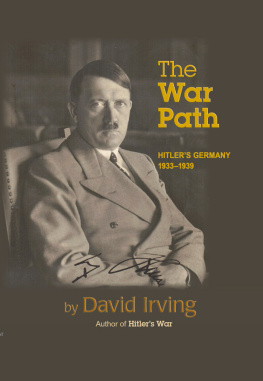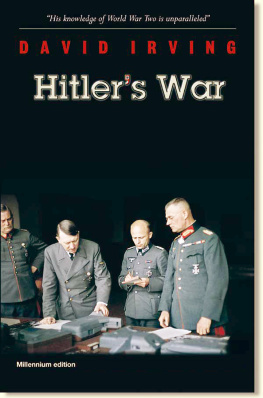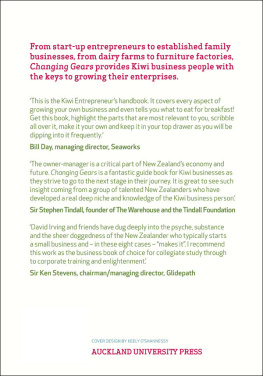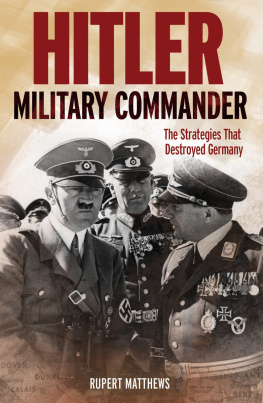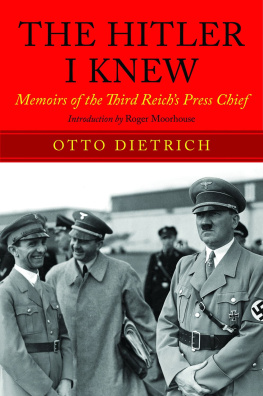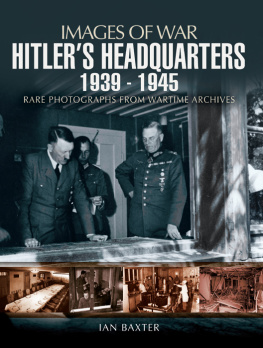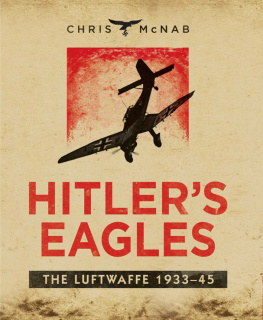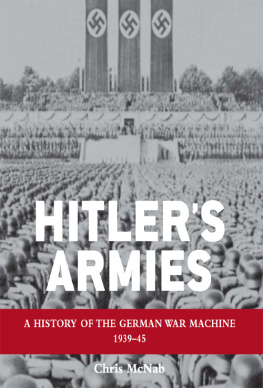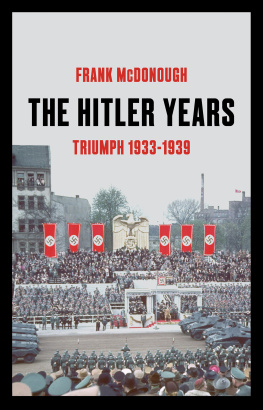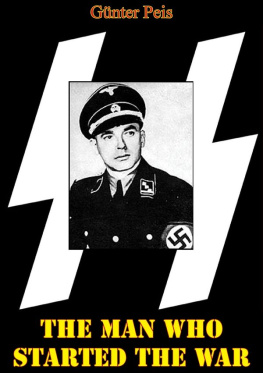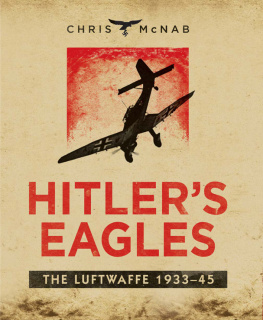
Adolf Hitler signed this portrait on November 6, 1937, the day after the Hossbach conference (see pages 623), for an English admirer, Pauline White of Teddington ( DON BOYLE COLLECTION )

What the British Press said about The War Path
The War Path is the prelude to the brilliant, wilful and ingenious Hitler's War, published last year. In fewer than 300 dense narrative pages, the new book covers the main events of Hitler's career from his accession to power to the British and French declarations of war six and a half years later... Irving has lost none of his skill in delivering the cautionary punch where he knows it will most hurt.
Michael Ratcliffe, The Times
T HIS is the first volume of a work, the second part of which has already been published under the title of Hitler's War... Like its predecessor it is based almost entirely on original sources, many of them unexamined until Mr. Irving himself tracked them down. Usually he coaxed them from the widows of the original participants, and it is some indication of his detective skill that he actually located the Frau von Blomberg whose marriage to the Field Marshal, and the row which resulted, was to be the undoing of the German High Command. Mr Irving's most important sources, however, are the wiretaps of the German Foreign Office... and the ignoring of these by historians is something of which he has every right to complain. These intercepts of diplomatic and other traffic shed an entirely new light on Hitler's conduct of foreign relations.
Michael Howard, The Sunday Times
E VEN those historians who go purple in the face at the mention of Irving's name admit admiration of his vast industry, tireless research and the patience with which he prises hitherto unsuspected records from the attics and locked trunks of survivors from Hitler's Germany... In his latest book The War Path he has... been the first to unearth a crucial series of speeches by Hitler to his generals outlining his war plans.
Daily Mail
D AVID Irving is a strange bundle of contradictions. At one moment he is the skilful publicist, planting a time-bomb which he hopes will sell his book. At the next he is the patient researcher of unrivalled industry and success... Irving shows correctly that although though Hitler exploited anti-semitism before he became Chancellor, thereafter he concerned himself Little with its practical application and indeed reacted violently in the autumn of 1938 when it interfered with his foreign policy. Irving also shows correctly that Hitler was an opportunist who took advantages whenever they offered themselves... I formulated these views nearly twenty years ago and am delighted that Irving follows loyally in my footsteps... Irving sometimes abandons his researches and goes in for fine writing... There is more good scholarship than sensationalism in Irving's book, though there is some sensationalism as well.
A J P Taylor, The Observer.
O NE of the greatest virtues of David Irving's many books on Germany's part in the second world war has been his uncanny gift for ferreting out new sources of evidence, and the assiduity with which he has mined the vast collection of captured documents before which lesser mortals quailed.
Professor Donald Cameron Watt, The Daily Telegraph
Hitler's War attracted mixed reviews. Academic historians were unanimous in praising the author's industry, scrupulous documentation and readiness to ask new questions about the policy and strategy of the Second World War... In The War Path the author accepts and propagates the most traditional and anti-Hitlerian explanation of that outbreak: that Hitler had from the very beginning of his political career planned to lead Germany to empire in central and eastern Europe, that he had a programme of necessary preliminaries to that end which he systematically saw through and that the motives which underlay his policy were wholly and terrifyingly selfish... Nevertheless, the book reveals all the Irving virtues dedication to a point of view, immense readability, impatience with anything but original source material as well as the unsettling moral ambivalence (What does he really feel about the monster?) which is a hall-mark of what is now a one-man school of history.
John Keegan, The Guardian
About the Author
David Irving is the son of a Royal Navy commander. Educated at Imperial College of Science & Technology and at University College London, he subsequently spent a year in Germany working in a steel mill and perfecting his fluency in the language. Among his thirty books the best-known include Hitler's War, The Trail of the Fox: The Life of Field-Marshal Rommel, Accident, the Death of General Sikorski, The Rise and Fall of the Luftwaffe, and Gring: a Biography. He has also translated several books by other authors. He lived for 35 years near Grosvenor Square, London, and now in the country, and is the father of five daughters.
THE WAR PATH
HITLER'S GERMANY 1933-1939
David Irving
David Irving is in the first rank of Britain's
historical chroniclers THE TIMES
F
FOCAL POINT
The Publishing History of this book
This text was originally the first part of the major biography, Hitler's War. While editing the German edition, Hitler und seine Feldherren, Wolf Jobst Siedler of Ullstein Verlag omitted it and made other significant alterations without consulting the author. The author halted all sales on publication day in 1975 a sad end to twelve years work.
In England rights lay with Weidenfeld & Nicolson, but in the early 1970s Lord Weidenfeld came under pressure from three foreign embassies, as he verbally confessed to the author, and cancelled the agreement. The Viking Press (USA) published Hitler's War in 1977, and The War Path in 1978; Hodder & Stoughton Ltd and Michael Joseph Ltd (UK) followed suit, as did publishers in other countries to great critical acclaim. The author's regular Spanish publisher Editorial Planeta published it briefly in Spain and Latin America, and Arnoldo Mondadori Editore translated, but did not publish, the Hitler biography in Italy; both firms then came under outside pressure to stop publication.
FOCAL POINT
Copyright 2013 Parforce (UK) Ltd.
All rights reserved. No reproduction, copy or transmission of this publication may be made without written permission. No paragraph of this publication may be reproduced, copied, or transmitted save with written permission of in accordance with the provisions of the Copyright Act 1956 (as amended). Any person who does any unauthorised act in relation to this publication may be liable to criminal prosecution and civil claims for damages.
First published 1978 by The Viking Press (New York), and Michael Joseph Ltd (London)
British Library Cataloguing-in-Publication Data. A catalogue record for this book is available from the
British Library.
This edition ISBN 1 872 197 36 1
ePub ISBN 9781872197029
Mobi ISBN 9781872197036
Author's Foreword
T HIS BOOK NARRATES one man's path to war Adolf Hitler's. The narrative ends at the precise moment when the companion volume, Hitler's War, begins: the evening of September 3, 1939, as he leaves his Berlin Chancellery for the Polish war-front. Like that volume,

